
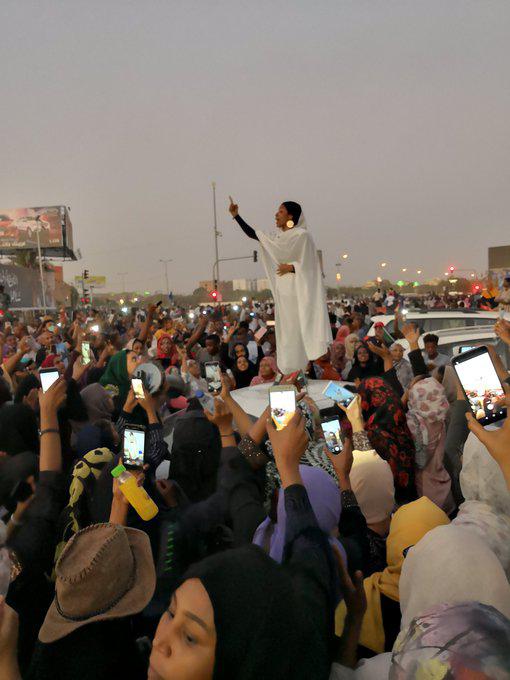
We have met with a comrade from Sudan who lives in our city of Lund, Sweden, to talk about the revolt taking place in Sudan. Our aim with this interview is to forge internationalist links across the globe with other subjects in revolt, to learn from this experience and to spread information on an important, but neglected, struggle.
In this interview Mohamad touches on many of the topics that we believe are essential to understanding our present reality and to forge a path ahead. The role of women in the struggle is of particular note, a situation which is at the forefront of every large-scale social movement. The intersection of class and gender is one we must pay attention to theoretically as well as practically and is made very clear in this interview. All reactionary notions that we should realign our politics to a supposedly reactionary, masculine working class subject which is promoted by various “leftists” is again put to shame when we look at the Sudanese revolt. Without feminism, there is no broad social movement that can take on state and capital.
The role of racism and imperialism is also clear in the interview: without EU (and thus also Swedish) money which is funneled to militias in Sudan and elsewhere to ensure detention of migrants then the Sudanese regime would be far weaker. Mohamad traces the role of the border and of migrants as it cuts through Sudan, to Fortress Europe and into Sweden itself. The struggle is not “over there” in Sudan (or for that matter, in Rojava, in Hong Kong or wherever) but the fight in Sudan is also here, now, and we are in Sudan. This is a building block of the internationalism we must create, to politically and practically construct a joint “we” that at the same time doesn’t erase the particularities of the local but at the same time develops a joint, objective subjectivity. We call this objective subjectivity communism, in the same vein as Marx when he says “Communism is for us not a state of affairs to be established, an ideal to which reality will have to adjust itself. We call communism the real movement which abolishes the present state of things.”
This interview took place on the 18th of August and all references to dates should keep this in mind. It has been edited for brevity.
Autonom Organisering, September 2019
---------------------------------------------------------------------------------------------------------------------------------------
AO: So start by telling us some about yourself, such as how old you are, that sort of thing.
Mohamad: My name is Mohamad Abdul Aziz, I am 32 at the moment and I work at Smålands Nation, in Lund, Sweden.
I come from Sudan, and I am from there, my parents are from there, I have spent most of my life in the diaspora in Saudi Arabia but we have been back and forth and I have moved completely to Sudan since 2005 when I moved there for university.
AO: And maybe you can give us a brief introduction, the Wikipedia-esque introduction to this, how many live there and that sort of thing
Mohamad: Sudan is a country that is situated in east Africa that is bordered with a lot of countries, the most significant of them are Egypt, Ethiopia, Eritrea from the east, to the north side, South Sudan in the south and then we have Chad in the west, we used to be the biggest country in Africa before the independence of South Sudan. And about 35 million+ at the moment live in Sudan with probably one tenth of them living in Khartoum, the capitol. Khartoum. Sudan has gained it’s independence in the 1956 after the British independence and before that the Ottoman occupation as well. That’s the fastest way I can summarize it.
AO: And now, can you tell us about the current political situation in Sudan?
Mohamad: Of course. First of all, one of the most important thing that should be understood is that this is continuous build-up, this exact revolution, since ’89. And this counts as the third popular revolution in Sudan as well. This revolution started in the middle of December outside of Khartoum as an act of defiance against the austerity measures of the government and the dire living situations
This counts as a sort of backlash against austerity measures that were taken, that were decided upon earlier in 2018. Two days after the 16th of December in 2018, in Nile River state in Sudan, the key key opening event happened in this revolution where some revolutionaries burned down the headquarters of the AlmtamarAlwatani/the National Congress Party, the party that is in power in Sudan. This fire started the whole revolution and made it way more viral throughout Sudan. And since that day, since the 18th of December, until the 6th of April, the next key thing, it was just a long series of protests, strikes, and other revolutionary acts until the biggest event in the revolution took place which is the sit in.
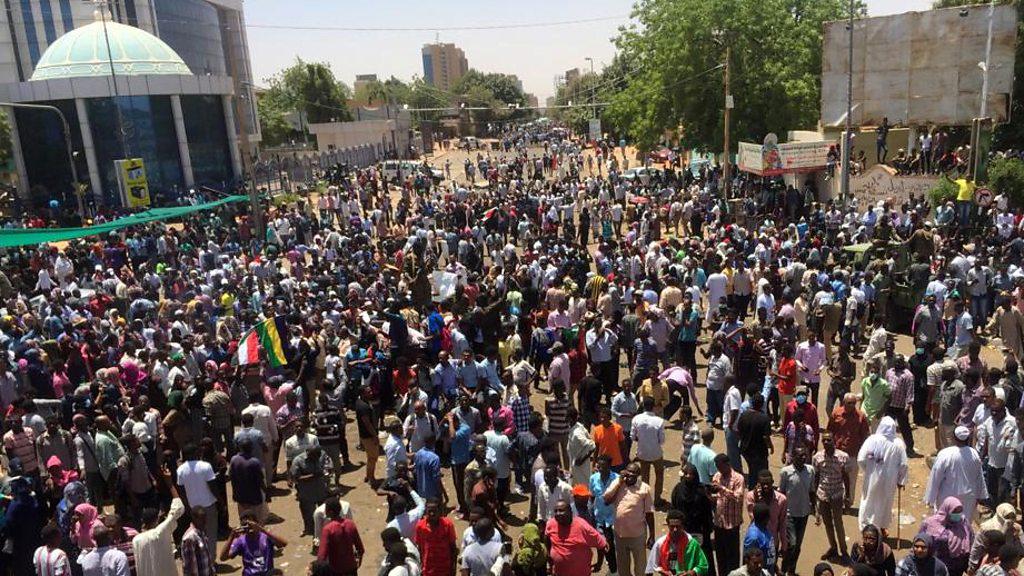
There were many, many big protests around Khartoum that took place but they all marched to the same place and they just took over the place until the 3rd of June when the massacre happened and the whole sit-in was dispersed. This was followed some more political approaches that ended up with the signing of a treaty between the Sudanese Professional Association and the Freedom and Change Coalitions, and the military council on the one hand. This happened yesterday. And I think it is also important to mention for this interview that the main body, revolutionary body, for this revolution is called the Sudanese Professional Associations which is a coalition of different unions across many, many fields from white collar to blue collar workers and they have been organising themselves in parallell unions.
This body has managed to create what we call a parallel union because in Sudan since this current government, the current party in power, the ex one at the moment what they did when they came to power they did something called the entity union rule where people caught involved in union work outside their exact working building or warehouse or factory got into trouble. Such a union body will not be legally recognized and thus liable by law for unlawful organization.
This caused a lot of fragmentation in the union because you cannot have horizontal union where you can have qualitative power, that can be of good momentum to fight the system. So this changed now with parallel unofficial union and another thing that contributed to this that was created in parallel to all of this, this also led to a very very successful countrywide strike, of two days in June. It was very interesting, it was very good, it was probably the biggest of it’s kind in the whole of North Africa and it gave a lot of leverage to the revolutionaries after the implementation of it.
AO: So, you seem to be saying that the workplaces are somehow the locus of the movement somehow. Is this different than what we’ve seen in Egypt in 2011? There seems to be a similar dynamic in some respects but perhaps this is quite different?
Mohamad: It definitely is different. It is also a sensitive topic in the moment to always compare to Egypt due to their historical relationship that facilitated the colonialism of Sudan via Egypt, but I can say that it is similar because the Egyptian revolutionaries have done some similar tactics, because it is a fact that we have taken a lot of lessons from Egypt, Libya and Syria since it was one of the closest experences we have in our mind, and there are some similarities to the revolutions in Sudan in the 80’s and 70’s, the two big revolutions, but it’s way more relevant to relate to the experiences of Libya and Egypt and Tunis, and Syria.
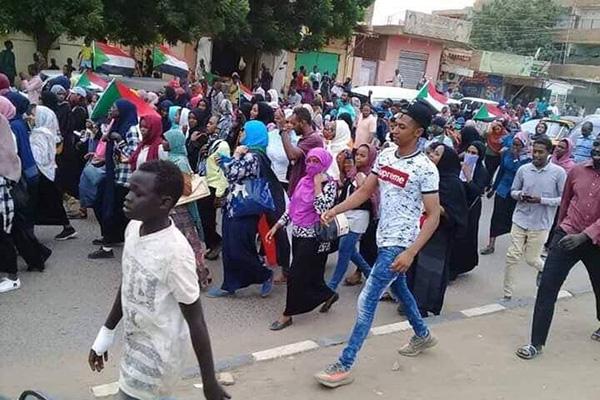
Beside this, as I told you in the start, this has been a very slow build up since ’89, since this government came into power. The opposition has been taking so many forms but what has been very obvious this time, that this has been made by two major streams of revolutionary acts, first of all the student bodies. The student bodies have been in the front since ’89, but both the two waves that came in the December revolution of 2018 was caused by high school and university students, there are lots of student association who have been involved in revolutionary activities since the 90’s and the late 80’s, but this has been the most obvious where the majority of the bodies on the streets are students. On the other hand this has been 100% influenced by women, one of the most important chants in this revolution is that this is a revolution of girls.
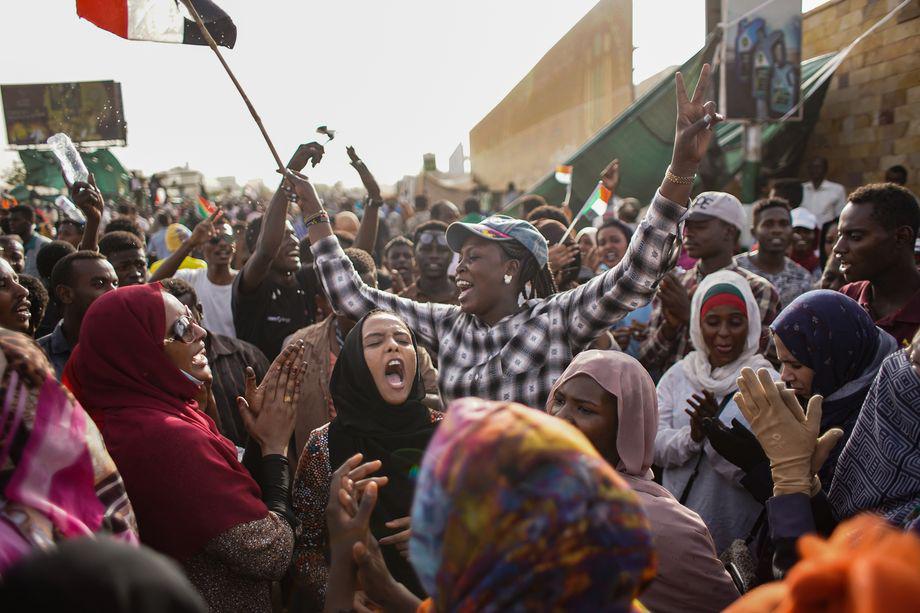
With social media we can see it more, because it is still some sort of conservative society, or there are some conservative values in the center [of it] at least, but with social media we can see the involvement of women in all levels of revolution. From neighborhood committees and revolutionary councils to the bigger, more political bodies
AO: Maybe you can develop the discussion on the protestors on terms of their composition, what currents are there, from for example we can recognize as anarchist or autonomous, are there Marxist-Leninists, national bourgeoisie, Islamists and so on?
Mohamad: Tough question! So.. I can say that the radical left in Sudan is not as out as you can see in Europe. We have a lot of Marxist-Leninists and that is the Sudanese Communist Party, they have also been one of the longest involved people in this things to the moment that they have their own revolutionary organization working with the Communist Party. They’re working with people in the ground and this is one of the nicest things to see in the revolution.
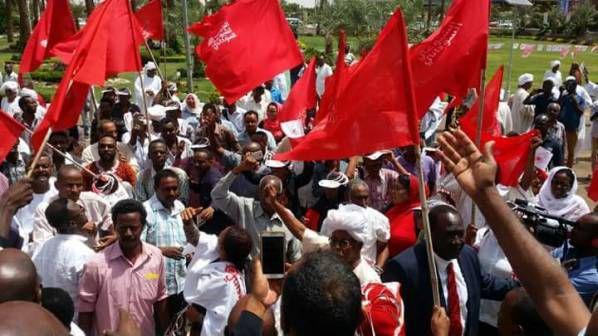
There are anarchists but we don’t work as collectively as we would like to, but I can say that at this moment of time I personally think that there is this vague ideological identification crisis that we have. Everyone wants to get done with this, at some times it can feel as if they are very vague about their ideology which is also problematic because a lot of people now are still okay with a lot of neoliberal resolutions that are coming out, like… The guy who is being nominated to be Prime Minister at the moment is a guy who is known for his work with the IMF and the World Bank and he is getting a lot of like acceptance from people on the grond which is one of the problems, but you always see people on the left saying no on this. But the majority still believe in the technocracy, they think you can do this without ideology, without political affiliations, but I think this is also an integral part of switching the whole consensus to the left, because we’ve been having a very limited political practice for the last 31 years and this is something that will change. And this is the first time that communists are not stigmatized. You see communists in the streets, you see communists doing organisation work, you see them in protests, in the sit-ins and they don’t get as much backlash as they used to under the Islamic government back in the 90’s and 2000’s, so this is one of the most important transitions.
But on the other hand the main mission, the main push of all the organization work is a truly anarchistic organization format. Everything that has to do with the protests was established with neighborhood committees. Every neighboorhood had a committee that was also split to other committees, so we had a committee that was doing all the propaganda work, and this is all over Khartoum and also the other cities. In every neighborhood there is a committee that is doing propaganda, that is doing security work, they are also doing a lot of protest organisation, and this is what they do, on big days like 6th of April they organise through the whole city, they were taking care not to be caught, or recognized by the authorities and they managed to do this. It was really surreal to see such big organisation work with no funding and with very, very bad safety conditions. And in one day we got almost 3 million people in five square kilometers in less than two hours. And this is one of the most impressive things I’ve seen in my life, just by neighborhood committees that originally started in the protests and the uprising in 2012-2013, and in less than six weeks we organised on such a very very sophisticated level, I was almost surprised. I was involved with some of the committees but I stopped 3-4 years and seeing how big they got is breath-taking.
AO: So, was Sudan a democracy of some kind before this latest protest wave or was a it a quote-unquote ”democracy”, an open dictatorship, something else?
Mohamad: Sudan has been a roller-coaster. So we gained the independence in ’52, and then there have been a lot of these governments. There are two democracies, the one that happened in the early 80’s and then the second democracy in ’85. This was also like, the current government did a coup on. But they also have the same problem of being ideologically vague, except for two governments, one of them was communist and it turned back very quickly. It’s also very ironic that the communist party Via Nimeri came into power in the late 70’s, early 80’s and then managed to establish sharia law in the 80’s. The sharia law was established and the funny thing is that it is not established by the Islamist government which came in 89. And this was also the first hit to the unions because unions were being attacked and one of the biggest unionists was killed. Also some of the most prolific unionists in Africa were killed and arrested. Then the second wave of the attacks against unions came with the Islamic government in 89.
There hadn't been a democracy per se. The government which was just toppled in april, they did some elections but we know that it was not fair elections, it was cheating. They’d probably won, but still the numbers were inflated so hard beyond imagination.
AO: But is there then now, as Italian Marxist Mario Tronti said, to be defeated by democracy rather than by dictatorship?
Mohamad: So the main cause is now that this is the biggest thing of the revolution. We know we exist, we know our voice. It’s going to change things. Now you can see this all over Khartoum, this is such an interesting thing that happened in just a few months. Whatever injustice you face from authorities there is going to be a small protest out of nowhere. People are going to do something about it. One of the biggest democratic acts in my opinion that took place is reclaiming public spaces. There have been a lot of these… they’re called surveillance committees, groups of intelligence people, they were all taken over now by a lot of neighborhood committees. They were just totally taken over by neighborhood committees and they are practicing their revolutionary organization acts from there.
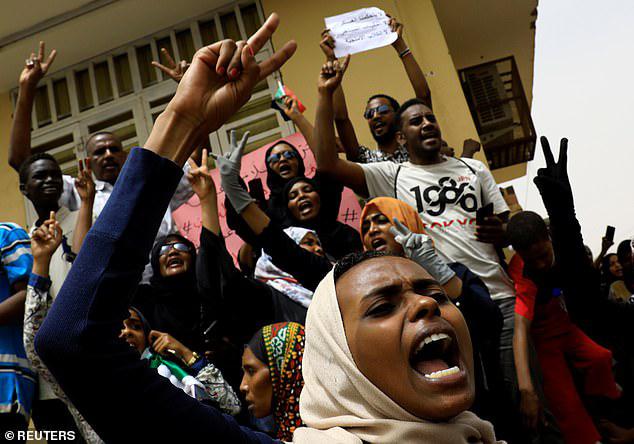
AO: So, what is there to be learnt from the protests as people situated in the global North?
Mohamad: I wrote about this on Twitter, a couple of months ago. I think this whole revolution is a gold mine of tactics, and this is to the comrades in the global North, this revolution is a gold mine of tactics and organization methods to be learned. And knowing that we are working in dire, dire situations when compared to here I think there is something to be learned especially from the tactics. Other than this… I am personally not all for peaceful demonstration all the time. I believe everything has it’s own measures but this revolution has also been a lot of people who had more privilege had also been involved in this revolution, and they know from the geographical location of Sudan that they will not be attacked by weapons and stuff like that.
But this shouldn’t criminalize or shame the armed resistance movements that we had in Sudan, especially in the west and south, since the 90’s, but we have managed to do this with almost no offensive tactics.
AO: Can you maybe go into a little bit of detail on these tactics that you think we can learn from?
Mohamad: Of course, of course. Most important thing is the neighborhood councils, it had been shown that this it’s a necessity that we did not know about it in the past revolutions, or in the past uprising that failed in 2012-2013, that the moment you have a solid neighborhood council it doesn’t matter if you only have 3-4 people who know each other and know the basics of staying secure and safe. And then it’s magic, you just go out into the neighborhoods, with brochures, talk to people face to face, and most importantly link up with other neighborhood committee. And the moment you have this network the revolutionary act is way, way, less intensive than what you do in a big scale.
This had also been done through a lot of things that can be done in the local, I don’t think it can be done anywhere else. We have organised such a big protest in June, it was almost two million people and a half and it had no Internet. It was a call back to the 70’s, when people had drop papers at everyone's places, when they had speakers in the neighborhood to get people to do stuff.
But also the most important lesson is that in Sudan we are under so many colonial forces, most people in the world think we have established this independence. We have been talking for years with Saudi Arabia and we have some special economic relationship with Egypt that almost everyone is against now. It was very obvious yesterday when the Egyptian representative talked in the signing of the deal. No-one gave a fuck. No one was clapping. It was very weird for this situation, and now people are doing this with Saudi. And Saudi and Sudan also have a very weird relationship since a lot of the RSF, the Rapid Support Forces, one of the most involved ex-government militias in the protests, they did most of the killing and the dispersion of the sit-in as well. They fight with Saudi in Yemen, so they have around 10 000 foot soldiers fighting in Yemen on the behalf of Saudi. That is why Saudi was involved in this revolution because they didn’t want to get their voice done, because they still want the soldiers in Yemen, they still want to continue the old arms deals and defence deals with Sudan. Because Saudi has always depended upon Sudanese labor, since it’s beginning. And as even my parents did, I grew up in Saudi Arabia.
And then Egypt, it has facilitated most of the colonization of Sudan.
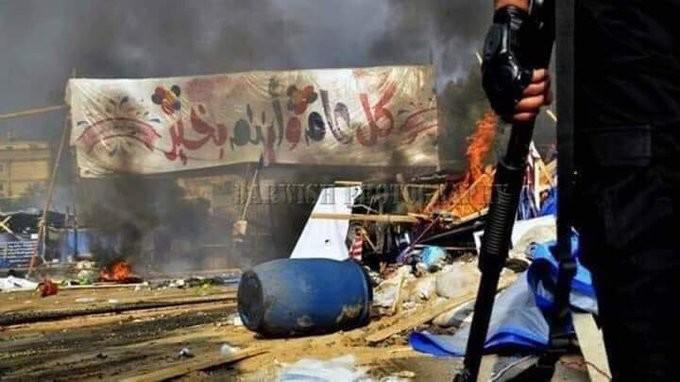
AO: As internationalists, what can we do for international solidarity work with the struggle in Sudan? Can we do something?
Mohamad: In Sweden, as comrades in Sweden, you have been directly funding the system through your tax money and especially the militia that I was talking about, the Rapid Support Forces, through a series of initiatives and the most important one of them is called Process Khartoum. Process Khartoum is what is called a passive migration control policy, where the European Union is paying a lot of money to actors in Africa to stop the migration lines, the biggest one of those goes through Sudan.
It comes from Eritrea, Ethiopia, Somalia and Kenya and goes all the way to Libya. So through this the Khartoum Process the initiative I just talked about the EU pays money to the Sudanese government, but we know 100% that it goes to the Rapid Support Forces which they disperse to a lot of their militias on the borders of Eritrea, Ethiopia and Somalia and then again in Libya. And they just take control of these people with your money, they have also been a facilitator of the slave trade.
And in Sweden it is calculated that you pay directly to this with your tax money. So this is the most important thing for comrades in Sweden to know. Also, we have been having very good contacts with unions and friends in France and in England as well. And they have also been talking about the Khartoum Process and the involvement in solidarity campaigns, mostly of awareness campaigns, and some of them have actually collected donations. Though the financial channels to Sudan are a bit tricky so you have to have some contacts there. But other than this, the whole discourse against the migration control process.
AO: So to backtrack a little bit, I guess I only have two more questions, which is number one, you talked about the role of Egypt and Saudi Arabia and the EU. Are there also other imperial powers at play? What do they do? What do they want? Does it have to do with resources? Or geostrategical location?
Mohamad: So the thing about Saudi is that it is also the proxy to America, so this is why Saudi becomes even more important. In the 90’s, the US has taken the responsibility to impose financial embargo on Sudan. So we are not allowed to do any financial relationship on the national level with the US and it’s allies. So we have also been under this the embargo made America make Saudi’s role more important. It is even funny that one of the first exploration oil companies, under the embargo, is Exxon. Exxon Mobile was there despite the embargo and it was facilitated through Saudi. The other imperial power is also the Emirate, which is also in the axis, America, Saudi and the Emirates.
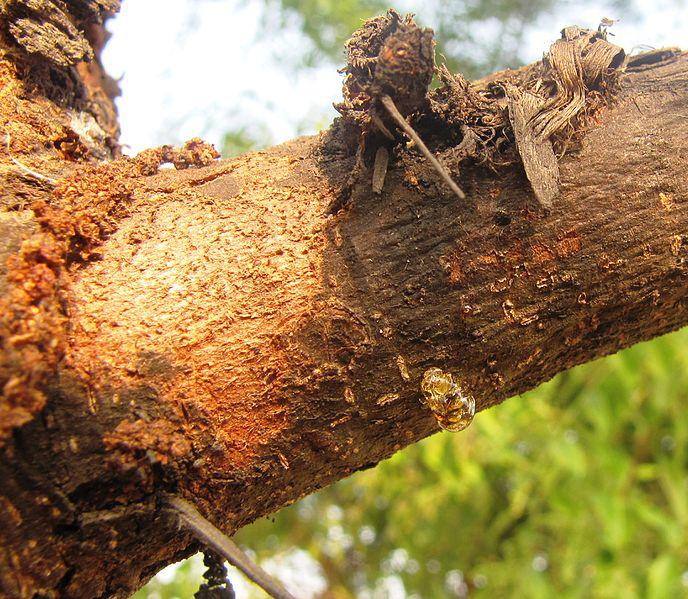
Gum Arabica
We had, it’s defunct now, we don’t do it anymore, but we had very good relationship to Russia via Iran until Sudan decided, the ex-government, decided to fall within the US-Saudi axis so they had to cut all ties with Iran. But yes, Saudi, Emirate, US is the biggest thing we got. The US gets lots of resources from Sudan. Most of the world’s gum arabica which is a very important thing in a lot of food industries, a key ingredient in soft drinks. Probably 70-80% of Sudan’s gum arabica goes to Coca Cola, through a channel that goes through Saudi. It’s almost one of these black, no-go areas, it’s a monopoly by the government and it all goes to Saudi and for the moment, that is probably the worst thing that we go through. America now has more direct contact now that the government has been toppled and it’s been for two things at the moment, just to maintain the leverage of Saudi in Yemen, and also to simply continue to get resources from Sudan. And gold as well, it’s not that big, but a lot of gold goes through Emirate, it gets washed through the RSF, The Rapid Support Forces, which has a monopoly on this, the biggest gold mine in Sudan and they, and its funding them and it’s funding Saudi.
AO: And you talked about women’s role in the struggle before. Is there some sort of overt feminism or is it more that women take part and through this there is some sort of implicit feminism?
Mohamad: It’s amazing, It’s quite open feminism, a lot of women have gotten active through the revolution and it’s amazing. It’s amazing to see how under these very, very dire circumstances there are also influence by some societal currents, other than the norm, the masculinity and the community is still very problematic. At the moment the revolution was happening and when people were taking over public spaces they could have unfiltered communication between them has shown that. We have a lot of feminist initiatives now, we have some of them that has been going on against FGM, female genital mutilation. Now the latest one of them is a coalition, one of them is called ”Fifty”, and it’s calling for 50% representation of woman in all levels of governance in Sudan and this is also a coalition of all the feminist movements, also the FGM one and others and it’s getting a lot of momentum at the moment.
AO: Is there something you would like to add? Is there something we didn’t touch upon? Is there a cool slogan you want to share with us? Or something to tie up this interview
Mohamad: Yesterday I was at this mini film festival in Malmö with Sudanese movies. And the discussion afterwards was about art and revolution, as someone who studied architecture in my bachelors it was very interesting to see all these public spaces that are in Sudan, especially in the sit-in. The place is called [is the] Army Headquarters, so it’s very close premises to the army and people just took it over when they came and it turned into a very artistic place and it was very interesting to see this very nice, to see people doing poetry, graffiti, singing, they were having discussions, they have open debate circles in the middle of nowhere and it’s very nice to see that we are capable of doing this, in the moment we are capable of just being able to re-take our freedom.
This is a fun fact, the sit-in was called the Commune for a long while. It was almost self-sustaining, the Nile was close by, and there were some pharmacies close by, so people were just managing. The most important part in the whole thing was the sit-in, because it was so fucking organised, all the neighborhood committees came there. So there were checkpoints in the start, then kitchen, communal kitchen, small clinics…
The sit-in is probably one of the nicest places in the revolution and it ended tragically but it was definitely my favorite.
AO: Thank you so much!
Autonom Organisering